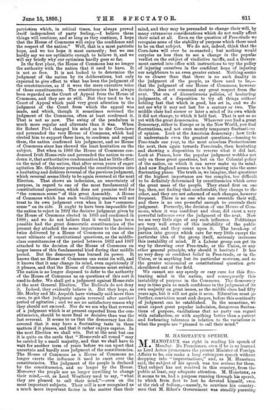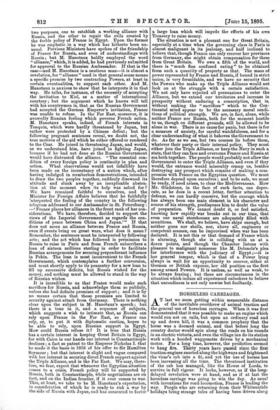M. HANOTAUX'S SPEECH.
MHANOTAEX was right in reading his speech of • Monday. No Frenchman, even if he is as learned as Lord Acton pronounces the present Minister of Foreign Affairs to be, can make a long extempore speech without dropping into " improvisations," and, as M. Hanotaux said, the subject of his speech was too serious for them. That subject has not received in this country, from the public at least, any adequate attention. M. Hanotaux, as it seems to us, had a purpose running through his speech, to which from first to last he devoted himself, even at the risk of tedium,—namely, to convince his country- men that M. Ribot's Government was steadily pursuing two purposes, one to establish a working alliance with Russia, and the other to repair the evils created by the feeble policy of France in Egypt. Upon the former he was emphatic in a way which has hitherto been un- usual. Previous Ministers have spoken of the friendship of France for Russia, and even of understandings with Russia ; but M. Hanotaux boldly employed the word " alliance," which, it is added, he had previously submitted for approval to the Russian Ambassador. If that is the case—and M. Han otaux is a cautious man—it is almost a revelation, for " alliance " used in that general sense means a specific promise by two contracting Powers, at least in certain eventualities, to support each other. And M. Hanotaux is anxious to show that he interprets it in that way. He talks, for instance, of the necessity of accepting the invitation to Kiel, as a matter of international courtesy ; but the argument which he knows will tell with his countrymen is, that as the Russian Government had accepted the German Emperor's invitation, France was unable to refuse. In the Far East, moreover, it is avowedly Russian feeling which governs French action. M. Hanotaux speaks, indeed, of French interests in Tonquin, which were hardly threatened by Japan, but rather were protected by a Chinese defeat ; but the following pregnant sentences reveal, we doubt not, the true motives of the aid which he either offered or rendered to the Czar. He joined in threatening Japan, and would, as we understand him, have joined in fighting Japan, because if he had not done so the Russian Government would have distrusted the alliance. " The essential con- dition of every foreign policy is continuity in plan and action. What observations would not infallibly have been made on the inconstancy of a nation which, after having indulged in numberless demonstrations, intended to draw the two peoples together, suddenly disowned its attitude and slunk away by an inexplicable absten- tion at the moment when its help was asked for ? We have remained faithful to ourselves, and the Minister for Foreign Affairs believes that he faithfully Interpreted the feeling of the country in the following telegram addressed to our Ambassador in St. Petersburg : —` France places her alliances in the front rank of her con- siderations. We have, therefore, decided to support the views of the Imperial Government as regards the con- ditions of peace between China and Japan." If that does not mean an alliance between France and Russia, even if events bring on great wars, what does it mean ? Remember, the sentences must be interpreted by following acts ; and the act which has followed is permission to Russia to raise in Paris and from French subscribers a loan of sixteen millions sterling in order to facilitate Russian arrangements for securing preponderant influence in Pekin. The loan is most inconvenient to the French Government, which contemplates a further conversion, and must shortly apply to its peasantry for a new loan to fill up successive deficits, but Russia wished for the money, and nothing must be allowed to stand in the way of Russian wishes.
It is incredible to us that France would make such sacrifices for Russia, and acknowledge them so publicly, unless she had definite promises of support ; and it is by no means certain that those promises are limited to security against attack from Germany. There is nothing clear upon the subject in M. Hanotaux's speech ; but there is a tone in it, and a sequence of subjects, which suggests a wish to intimate that, as Russia can rely upon France in the Far East, so France can rely, or, to put it with diplomatic caution, hopes to be able to rely, upon Russian support in Egypt. How could Russia refuse it? It is true that Russia has a certain interest in keeping Great Britain in Egypt, for with Cairo in our hands our interest in Constantinople declines ; a fact so patent to the Emperor Nicholas I. that be made it the basis in 1853 of his offer to Sir Hamilton Seymour ; but that interest is slight and vague compared with her interest in securing direct French support against the Triple Alliance, and in the Far East. We may, there- fore, we fear, expect that whenever the Egyptian situation comes to a crisis, French policy will be supported by Russia, both in Constantinople, while negotiations are on foot, and on the Indian frontier, if it ever comes to war. This, at least, we take to be M. Hanotaux's expectation, in consideration of which he is ready to risk a war by the side of Russia with Japan, and has consented to foster a large loan which will impede the efforts of his own Treasury to raise money.
The situation is not a pleasant one for Great Britain, especially at a time when the governing class in Paris is almost malignant in its jealousy, and half inclined to believe that, though France can only recover her provinces from Germany, she might obtain compensation for them from Great Britain. We own a fifth of the world, and there is " much fine confused eating " to be obtained from such a quantity of property as that. The mass of power represented by France and Russia, if bound in strict union, is very formidable, and we have no security that the Powers who make up the Triple Alliance would not look on at the struggle with a certain satisfaction. We not only have rejected all persuasions to enter the Alliance, but we extend our territories and increase in prosperity without enduring a conscription, that is, without making the " sacrifices " which to the Con- tinental mind appear to be the necessary moral condi- tions of political strength. We are, in fact, alone, while neither France nor Russia, both for the moment hostile to us, though on different grounds, will be allowed to be alone in war. There is no cause for panic, but there is for a measure of anxiety, for careful watchfulness, and for a clear understanding of what it behoves the Government to do. As far as we see, but two courses lie before them, whatever their party or their internal policy. They must either join the Triple Alliance, or keep the Navy in such a state, that they can face and overcome France and Russia at sea both together. The people would probably not allow the Government to enter the Triple Alliance, and even if they would, the entrance would miserably cramp us, besides destroying any prospect which remains of making a com- promise with France on the Egyptian question. We must therefore depend upon ourselves ; and to be safe, we must be ready, if need arises, to clear the Mediterranean. How Mr. Gladstone, in the face of such facts, can depre- cate, as he does in a recent letter, further attention to defence, we can hardly conceive, but the courage which has always been one main element in his character and source of his strength, predisposes him to doubt the value of preparation. We cannot doubt it, or feel satisfied, knowing how rapidly war breaks out in our time, that even our naval storehouses are adequately filled with munitions. We shall, we believe, have ships enough, but neither guns nor shells, nor, above all, engineers or competent seamen, can be improvised when war has been declared. It is not this or that demand of France which is alarming, though she is colliding with us at a dozen points, and though the Chamber listens with pleasure to malignant nonsense like M. Deloncle's plea for interference with the judiciary of Egypt ;—it is her general temper, which is that of a Power lying always in wait for an opportunity to recover, either at German or British expense, her old position as the first among armed Powers. It is useless, as well as weak, to be always fearing ; but there are circumstances in the situation which induce all experienced onlookers to believe that unreadiness is not only unwise but foolhardy.



































 Previous page
Previous page